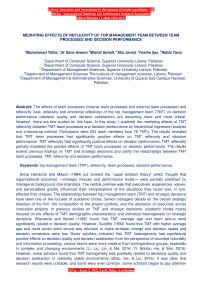Mediating effects of reflexivity of top management team between team processes and decision performance
Автор: Muhammad Talha, Sana Azeem, Mishal Sohail, Alia Javed, Fasiha Ijaz, Rabia Tariq
Журнал: Science, Education and Innovations in the Context of Modern Problems @imcra
Статья в выпуске: 2 vol.5, 2022 года.
Бесплатный доступ
The effects of team processes (internal team processes and external team processes) and reflexivity (task reflexivity and emotional reflexivity) of the top management team (TMT) on decision performance (decision quality and decision satisfaction) are becoming more and more critical. However, there are few studies on this topic. In this study, I explored the mediating effects of TMT reflexivity between TMT team processes and decision performance by hierarchical regression analysis and a bootstrap method. Participants were 524 team members from 76 TMTs. The results revealed that TMT team processes had significantly positive effects on TMT reflexivity and decision performance. TMT reflexivity had significantly positive effects on decision performance. TMT reflexivity partially mediated the positive effects of TMT team processes on decision performance. The results extend previous findings on TMT and strategic decisions and clarify the relationships between TMT team processes, TMT reflexivity and decision performance.
Top management team (TMT), reflexivity, team processes, decision performance
Короткий адрес: https://sciup.org/16010173
IDR: 16010173
Текст научной статьи Mediating effects of reflexivity of top management team between team processes and decision performance
Since Hambrick and Mason (1984) put forward the “upper echelon theory” which thought that organizational outcomes —strategic choices and performance levels— were partially predicted by managerial background characteristics. The central premise was that executives’ experiences, values, and personalities greatly influenced their interpretations of the situations they faced and, in turn, affected their choices. The relationships between top management team (TMT) and strategic decisions have been one of the focuses of academic circles. Senior managers decide on the overall strategic direction of the firm, the composition of the project portfolio, and the allocation of resources across innovation projects. In previous studies on TMT and strategic decisions, academic circles mainly focused on the effects of TMT demographic characteristics and individual heterogeneity on strategic decisions. Wiersema and Bantel (1992) found that TMT average age and team tenure were significantly related to decision quality. However, Sutcliffe (1994) found that TMT with higher average age and more senior team tenure was reluctant to make strategic change and decision speed and decision consensus were low. Some scholars indicated that TMT heterogeneity had significantly positive effects on decision quality and decision satisfaction from the perspective of bounded rationality and information processing, various teams were more creative than homogeneous groups, especially in complex and changing environments (Li, Liu, Lin, & Ma, 2016;
Previous studies on TMT and strategic decisions paid more attention to the effects of TMT on strategies, especially the strategy formulation. However, in the process of strategy implementation, there were few studies on how TMT members made overt reflexivity on the established strategies and timely adjusted them according to the variation of internal and external environments. Also, most previous studies on reflexivity mainly focused on the work teams, especially the innovative teams, research and development teams. Schippers, West, and Dawson (2015) concluded that team reflexivity was positively related to team innovation . Yang and Ge (2012) found that team processes among team members could enhance team task reflexivity. Liu (2017) found that team processes between supervisor and subordinate could enhance team task reflexivity. However, studies on TMT reflexivity, especially the mediating effects of TMT reflexivity in the relationships between TMT team processes and decision performance, are still blank. The questions whether TMT reflexivity has a direct impact on decision performance and whether TMT reflexivity can mediate the effects of TMT team processes on decision performance are still unknown. Therefore, I introduced reflexivity to TMT theory to explore the relationships between TMT team processes, reflexivity and decision performance and reveal the internal role mechanism of TMT team processes, reflexivity on decision performance, which would be an innovative research way.


